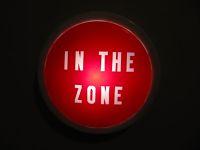Flow−the experience we have when we’re “in the zone”−has been studied for decades by psychologist Csikszentmihalyi. During a flow state, people are fully absorbed and highly focused…they lose themselves in the activity.
When your work utilizes your natural talents and motivations, when your daily grind is helping to create what really matters to you in life, then you are in your right work. There is a flow to it, an innate satisfaction abounds from it, and you derive genuine joy from what you do, a joy that is clearly evident to others.
Every job has a downside. We all have tasks we detest. Doing calculus homework in high school, for example, might be boring and hard if you have no knack for solving logical problems through numbers. You start but feel mentally exhausted, and you know you’re not getting the right answers.
But, you might also be an aspiring architect. Your math teacher clearly explains in detail how calculus can help you design more creative and ambitious structures. Your aspiration is personally important to you and the idea of creating interesting structures fascinates you. Suddenly, you see calculus in a new light. Instead of feeling exhausted by your homework, you now feel energized and motivated to learn to solve these problems. It’s the same work, but it now has a very different psychological effect on you.
Similarly, you might be in a helping profession, such as counselling, and have a strong desire to be self-employed in private practice working one-on-one with individual clients. But you can’t practice unless you have a funnel of clients who want your services. You don’t have a sales bone in your body. You once had a sales job and suffered burnout–it almost killed you.
But, now you gladly research sales and marketing tools techniques and implement them because your aspiration for self-employment is greater than you distaste for sales. You start to get clients and feel energized which, in turn, keeps you motivated to do the sales and marketing necessary to bring in clients.
Research shows that interest helps us perform our best without feeling fatigued. In one recent study, psychologists asked a group of undergraduates to work on word puzzles. Before they began, they were told them how exciting and enjoyable the task would be. Then they read a statement that framed the task as either personally valuable or of neutral value.
Those who read the first statement, and who also thought the task would be enjoyable, solved the most problems. Their engagement was more efficient because they were “in the zone” and not simply working on problems for a long period of time.
Psychology experiments often get participants to squeeze a spring-loaded exercise grip for as long as they can while performing another task to see if this increased performance makes people feel fatigued, or if high interest in a task maintains their mental resources. Much like the self-control needed to stay on task when we would rather do something more fun, resisting the urge to let go of your grip when it becomes uncomfortable also requires self-control. And that exertion of self-control is mentally fatiguing.
So, in a follow up study, psychologists found that people who thought the puzzle was highly enjoyable and highly important not only performed among the best, again, but they also squeezed the hand grip the longest. In other words, they solved the most problems, and it was not mentally exhausting for them. In contrast, those who were uninterested in the task generally performed worse, let go of the grip sooner, and were mentally fatigued by the effort.
Interest matters. It is crucial to keeping us motivated and effective without emptying our mental gas tank, and it can turn the mundane into something exciting.
Knowing the subject matter that most interests you, knowing your natural talents and motivations can help you harness “flow” to your advantage—to find your right work or advance your career.

